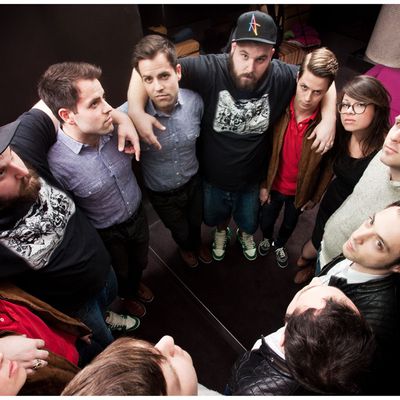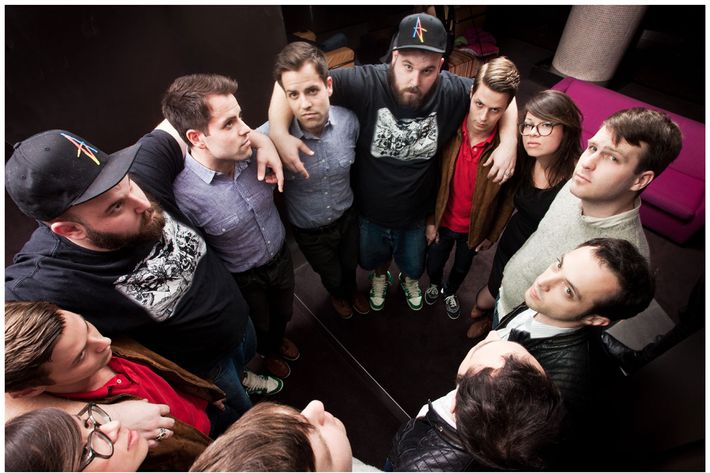

Last week, Fucked Up — the anthemic Toronto punk band behind 2008 Polaris Prize winner The Chemistry of Common Life — released their latest, a critically acclaimed concept album called David Comes to Life. The underlying story, as front man Damian “Pink Eyes” Abraham and guitarist Mike “10,000 Marbles” Haliechuk told Vulture, consists of three primary characters: David, the beaten-down narrator; Veronica, his inspiring new love; and Octavius, a dastardly villain intent on shattering David’s hope. Along the way there are fistfights, explosions, depression, meta plot twists, and enough heartache to fill a midsize cargo ship. Herewith: Haliechuck and Abraham’s full guide to David’s story line. Print it out, laminate it, keep it in your pocket.
1. “Let Her Rest” (instrumental)
Abraham: The music was completely done by the time we got around to doing the narrative. It was structured in a way that certain songs would have natural positions, like a climactic scene or an epiphany scene. And then we sat down, with a book on Shakespearean structure and a Wikipedia entry on play structure, at the Dufferin Mall, a not-so-great mall near all our houses. It’s neutral territory: All our great summits when we’re not agreeing are held there to avoid bloodshed. Almost immediately we decided it should take place in the U.K. and that it should take place in a time that wasn’t our own, and that we wanted a love component to it and a social component to it. The late seventies, early eighties was perfect: all our obsession with anglophile music, and the history of DIY and punk culture, and the death of labor that was happening at the time, could be played with.
2. “Queen of Hearts”
Haliechuk: It introduces where David’s life is at: He’s one of these downtrodden, factory-working-type guys; he has no hope that things are going to change, that things are going to get better to him. And as it always does, magically, some beautiful woman falls in his lap and he falls in love with her immediately.
Abraham: It’s about these moments of elation we get when we enter a relationship, when all of a sudden we’re snapped out of the darkest periods. You’re working your day job, and the next day work just seems bearable. Like, Wow, I can do this. Specifically, it’s about meeting someone who awakens a different something out of you, that first relationship that you have with someone cooler than you.
3. “Under My Nose”
Abraham: Specifically, this is about when I met my wife. It’s how about every moment we’ve lived, all the failed relationships: It’s all been worth it. We’d actually met years and years before [we dated]: Me and my friends used to be quite mean, and we used to make fun of her friends and her band and things like that. I realize now in retrospect it was a very adolescent way to show my affection. Years later she started coming into the video store that I worked at, and we started dating shortly after that. It just felt so perfectly juvenile and romantic and everything.
Haliechuck: David, though, is a character who is very negative. He’s experiencing all this good stuff with Veronica, but he’s always worried that something bad is on the horizon. The happiness is tinged with worry.
4. “The Other Shoe”
Haliechuck: And then the next song, things start to go wrong for him. It’s set to ruin; he can’t get over the dread that some bad thing is going to happen. Things are getting dark for him. The refrain is “we’re dying on the inside.”
Abraham: You wait for it all to fall apart in front of you, and it has to. You just have to brace for that; you can’t let it control your life — which is what, unfortunately, David does in the records. And all these songs can also be about falling in love with a subculture, or a politician. You have these periods that are so amazing, and then you see the flaws. I’ve seen it happen time and time again. Like any rapper says, “That’s the realest shit I ever wrote.”
5. “Turn the Season”
Haliechuck: The narrator is telling the audience that the previous song is true, you can’t have light without dark. And, at the end of the song, Veronica dies. We don’t explain what happens — we didn’t want the song to be pure narrative. Then it’d be a weird opera. It’s more about how they feel about these things that are happening.
6. “Running on Nothing”
Haliechuck: He feels terrible. He wonders why he spent any time on love, on another person. He thinks that it was all a waste. She’s gone, and he wasted all this time and emotion on her. He starts to give up.
7. “Remember My Name”
Haliechuck: That’s the narrator telling us: David’s right. He shouldn’t have spent any time on love. It’s better not to have those things then to have them and lose them. You’re set up for disappointment.
8. “A Slanted Tone”
Haliechuck: We introduce a new character, this woman Vivian who David has a history with. The story is coming from her perspective, and she’s telling us that you can’t always trust narration. She understands something about the narrator that no one understands yet.
9. “Serve Me Right”
Haliechuck: This is the narrator really bearing down into David now, saying not only that he’d be better off without love but that maybe the death of Veronica was David’s fault in the first place. And David is delivering this sarcastic soliloquy. He’s saying “maybe it was my fault, maybe I don’t deserve to be upset about it.”
10. “Truth I Know”
Haliechuck: The narrator now knows that the truth is out about him: He’s not just a passive narrator of the story, he’s got his own motivations. Now he’s making a plea to the audience.
Abraham: This is about the narrator, Octavius, trying to justify his role of being the narrator, and it’s indefensible. I certainly have been in this position many times. As a younger child, I certainly was a little more angry. A lot of anger came from insecurity, but it also came from this sort of cool, detached mentality: Straight edge means I’m better than you; punk rock means I’m better than you. As I’ve grown up, I look back upon it and realize that’s ridiculous.
11. “Life in Paper”
Haliechuck: This is David shooting back. He’s realizing that they’re all characters, and it’s not fair that one guy — the narrator, the figure of authority — gets to have control over the device.
12. “Ship of Fools”
Haliechuck: A classic side story. David and Octavius are personified by these two characters that are having a brawl. It’s two characters, sparring. You know, David and Goliath. And David comes out even worse.
Abraham: I see myself in all of these characters. Well, maybe not Veronica because she’s an idealized vision of perfectness. But Octavius, I have a lot of negative characteristics in common with. I’m vindictive; I’m jealous.
13. “A Little Death”
Haliechuck: David feels worse now. He’s lost; his whole world has been transformed. He doesn’t know what’s true. He doesn’t have any objectivity. He feels really depressed and is ready to throw it all away.
14. “I Was There”
Haliechuck: Vivian is telling exactly what happened at the moment of Veronica’s death. She’s saying she was there to witness the event, but also that she’s gone through this loss. You learn that Veronica died in a bomb blast. And at the end she’s condemned Octavius for being responsible for the death of Veronica.
15. “Inside a Frame”
Abraham: This is Octavius finally accepting what he’s done was wrong. He’s also realizing he’s done what he was fated to do, and so there’s still reluctant acceptance.
Haliechuck: At this point, all the characters are realizing they’re characters in a play. They don’t have free will. Octavius has been cast as the villain, but at the same time he’s been cast, so it’s not necessarily his fault. He’s saying he’s not as guilty as anyone else: He was just doing his job.
16. “The Recursive Girl”
Haliechuck: This is the point where the characters explain what they’ve learned. Vivian says she was in love with David and they lost their love and she was able to keep going, and she was able to keep their love with her wherever they went. This is a counterpoint to David: She was able to take his pain and that experience made her life richer.
17. “One More Night”
Haliechuck: Veronica comes back — I guess as a spirit or something — and they have some words. David says good-bye one last time, and he realizes that Vivian is right: that time with Veronica was worthwhile.
18. “Lights Go Up”
Haliechuck: David’s now an older person. He’s glad it happened and he wants to do it again. David goes back to the factory, and it’s a second chance. He’s learned what he needs to learn; he’s glad with his experiences. And he goes back and gets to live it again. The record sort of resets.

